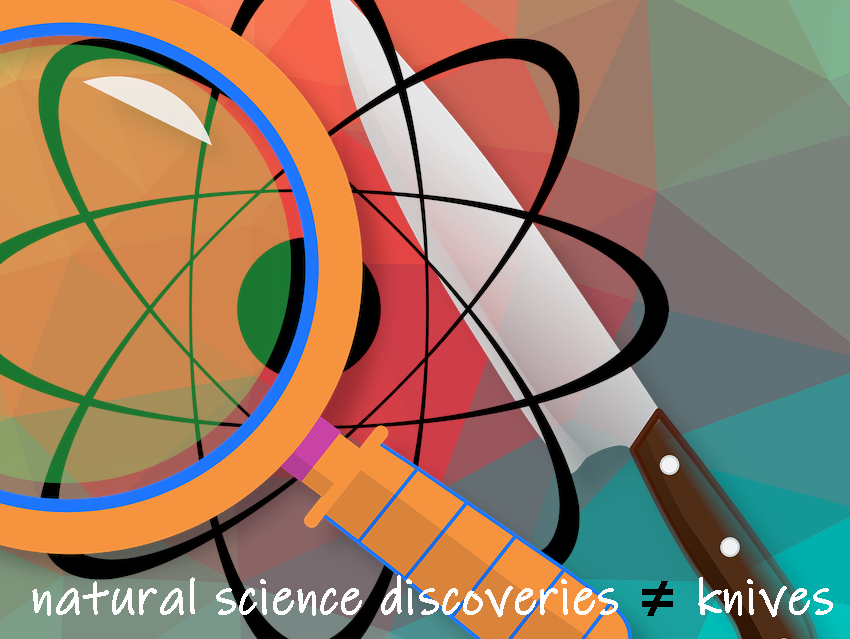Knives
Imagine you are a blacksmith, specializing in making beautiful knives. To add some more atmosphere to this imagination, let’s say you’re practicing your profession in a picturesque alpine mountain village. Maybe not so picturesque after all: Usually, there are lots of tourists clogging the narrow, steep alleys leading up to your secluded workshop. But at least, you make a good living from selling the fruits of your labor.
One day a friendly tourist visits you asking to buy a knife. You show him various models, and he finally buys one of the best pieces you’ve ever made. A few hours after he leaves, the police arrive at your workshop and take you into custody. When you protest, the officers tell you that the friendly man accidentally killed someone with the knife he bought from you. Thus, they argue, you as the one who forged the knife, are guilty as well.
Discoveries in the Natural Sciences
Now imagine you are a researcher (that might be easy). You make a groundbreaking discovery, you patent and publish your findings, and soon, you are admired by the scientific community. One day, a well-mannered businessman visits you in your office. He wishes to buy your patent to commercialize your discovery, and you agree. He leaves and you never hear from him again. A year or so later, the first products are launched. Unfortunately, it turns out that they can not only be used for the purpose the businessman intended, but also for some other applications that are, to put it mildly, highly questionable.
Let’s compare the two cases. Surely, the blacksmith is not guilty—and by the same logic, the researcher is also not guilty, right? If your answer was a resounding yes, you fell victim to a misconception that permeates the discussion on the social responsibility of the sciences to this day. Why is that?
Why Discoveries in the Natural Sciences Have Nothing in Common with Knives
The reason is simple, yet surprisingly easy to overlook: The average human being is perfectly able to understand the implications of using a knife, but not necessarily to understand the implications of using a scientific discovery. Consider that even experienced scientists struggle and fail to grasp discoveries outside their field (say, a synthetic organic chemist being confronted with the latest advances in RNA-sequencing or vice versa): How can one possibly expect a layperson to even remotely comprehend the consequences of bringing a scientific discovery to general use?
There is precisely one person who must step in: and that is the scientist who made the discovery. Doing this is the key responsibility any scientist takes over when starting to work on any research questions.
Equating this necessity with the well-known issue of ethics of conviction vs. ethics of responsibility is incorrect (the former prioritizes personal moral beliefs at the moment when assessing the consequences of an action, while the latter emphasizes the importance of considering the spectrum of potential outcomes of one’s actions). Doing so is a too easy way out, yet tempting, as it offers a comfortable “solution”: The scientist could then just state that it is, in any case, impossible to predict what someone might do with a discovery in one hundred or one thousand years, and thus move to the conclusion that nothing should be done.
It is true that such a prediction is impossible. However, this is not the core of the problem when it comes to scientific research, and deflecting the discussion in this direction is merely a rhetorical—and dubious—trick. The singularly essential aspect of scientific discoveries is their inaccessibility by the lay public. The responsibility of the scientist is not to predict every possible outcome related to their discovery (which is indeed impossible), but rather, to take care that this inaccessibility does not persist after the lay public is confronted with the discovery, or in other words: to take care that the inherent information asymmetry between the scientist and the public is balanced.
Science Communication Is Not Enough
If one jumps to the buzzword “science communication”, one would miss the mark. Science communication certainly covers an important part of the task: The rational explanation of core concepts related to a discovery in a way that is understandable to an educated non-expert. There are, however, two more aspects going beyond mere “science communication” that are frequently overlooked—and that are, arguably, even more important than the discussion of facts and figures.
First, there is a non-rational, even emotional aspect. When engaging with the public, the scientist may not present themselves as detached, but rather, prove by their very actions that they see themselves as a fully integrated part of the public. After all, any use and abuse of a scientific discovery will not affect the scientist primarily as an agent in the process of academic research, but rather as a human being within the social framework. This emotional aspect is a necessity for the scientist’s voice being credible in the discourse: The public must first be reassured on an emotional level that the scientist is not distant. Only afterward, all rational arguments may follow.
Second, there is a temporal aspect—or an aspect of succession. The task of keeping the scientific results accessible (emotionally and rationally) has no end. Any scientist is called to constantly scrutinize and re-evaluate their assessments in the public discourse. If the voice of a scientist becomes silent (be it due to illness, death, or because of unwillingness to further contribute to the discussion), the task of keeping scientific results accessible does not vanish, but rather, returns to the scientific community. In some sense, this call to fulfill the public representation of scientific research is the external founding myth of the scientific community (the internal one is, quite obviously, the shared set of instruments, standards, and interests).
Impact of Scientists’ Passivity and Detachment on Public Trust in Science
No scientist can avoid this call: It is an integral part of being a scientist, and if one negates it, colleagues would be imprudent to ignore it. Without support from the public, no scientific research is possible. However, this support and trust in science, in general, is dwindling at an alarming rate (as various studies show, see, for example, [1]); and this is a direct consequence of the passivity and detachment of scientists in the public discourse. The call to rebuild trust must be the top priority. Without it, we cannot hope to help solve the problems humanity is currently facing—problems that our research has, in part, created.
Reference
[1] Gallup Inc., Wellcome Global Monitor – First Wave Findings, London, UK, 2019, 76-103, esp. 78–81, 94. (accessed June 20, 2023)
Author

Leonhard Möckl is an independent group leader at the Max Planck Institute for the Science of Light in Erlangen, Germany. He works on glycobiology, super-resolution microscopy, and light-activatable therapeutics as well as philosophy of science, especially the interaction between science and society, epistemology, and responsibility in science.
